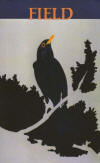Field – Fall 2013
Rather than mar pristine journals with my unkempt scribbles, I’ve taken to flagging particularly insightful or arresting passages in them with sticky notes. Suffice it to say, my copy of Field’s latest issue has more flags in it than the parking lot of a Toby Keith concert. Where other journals can feel bloated with uneven material, the new issue of Field weighs in at a lean one hundred pages. Sporting cover art by British artist Gary Hume, as well as poetry and essays by established and emerging writers, the new issue eloquently makes a case for Field’s place near the top of the poetry heap.
Rather than mar pristine journals with my unkempt scribbles, I’ve taken to flagging particularly insightful or arresting passages in them with sticky notes. Suffice it to say, my copy of Field’s latest issue has more flags in it than the parking lot of a Toby Keith concert. Where other journals can feel bloated with uneven material, the new issue of Field weighs in at a lean one hundred pages. Sporting cover art by British artist Gary Hume, as well as poetry and essays by established and emerging writers, the new issue eloquently makes a case for Field’s place near the top of the poetry heap.
It begins with a wise and lovingly curated symposium on the work of Gerald Stern, which intersperses some of Stern’s most gut-wrenching poems with essays from the contemporary poets indebted to them. That the editors of Field received new work from poets that was strong enough to counterbalance such a stellar opening section without the issue feeling completely front-loaded makes me optimistic about the state of contemporary poetry.
One of the poets that should make us all optimistic about poetry’s present is Bob Hicok, who contributes an essay to the issue’s Gerald Stern symposium, as well as two new poems. His “Why We Must Support PBS” is an absolutely hilarious stunner:
“I didn’t think of it as killing them,” the executioner
from the late eighteenth century said to Charlie Rose,
still wearing a hood, his axe resting on the wood table
I’ve assumed is oak. . . .
From such absurd beginnings, Hicok manages to smuggle in genuine pathos, as well as a spot-on portrait of Charlie Rose’s interviewing style. Put simply, it’s one of those poems you’ll be pestering friends and family to read.
Another of the issue’s standout poems is David Hernandez’s “Dear Death,” in which the narrator addresses a slightly more well-known executioner. “Cool cloak. So goth,” says the narrator, trying to ingratiate himself before assailing death with all those big questions one would want answered: “I dig how the pleats / ripple like pond water when you move.” Hernandez’s poem deftly satirizes the dynamics of power in a relationship with death that most people would rather not cultivate or promote. As in Hicok’s poem, humor slowly gives way to the ineffable. In language that is both thrilling and direct, Hernandez turns his attention to those moments during the course of an everyday routine when the specter of death casually sidles up to us.
In addition to the work of Hicok and Hernandez, Hugh Martin’s heart-stopping “Frisking Two Men in Sadiyah,” Leah Falk’s wonderfully puzzling “Chatterbot #1,” and Sarah Estes’s rhythmically inventive “Charity,” are all deserving of more thorough recommendations. The same could be said about many of the poems in the new issue. Deft sequencing and a satisfying blend of accessible poems with successfully experimental ones will definitely make for an engrossing reading experience regardless of your poetic affiliations.
Even the Gerald Stern symposium, which constitutes the poetics side of the journal, is clearheaded, heartfelt, and inviting enough to have broad appeal. While all of the essays contained in the symposium have something to recommend them, I felt that John Gallaher’s “On ‘Lucky Life’” and Bob Hicok’s “On ‘Waving Goodbye’” most eloquently zeroed in on what makes Stern’s work so emotionally robust and penetrating. About his ongoing relationship with the poem “Lucky Life,” Gallaher writes that it is a poem he has “returned to for some twenty years now, as one returns to the things that help, that recuperate the emotions that are so easily debased by common, uncritical use.” Speaking of Stern’s “Waving Goodbye,” Hicok writes, “This poem makes me consider poetry as a struggle against estrangement from our deepest selves, an effort to make the immaterial real—to give flesh, through language, to what we think and feel.” The eight Stern poems included in the issue easily bear out these lofty appraisals, and then some.
With their most recent symposium, the editors of Field have created both a terrific introduction to the work of an American original, as well a poignant reminder of his originality. They have also put together another superb issue filled with some of the most dynamic voices in contemporary poetry.
[www.oberlin.edu/ocpress/field.html]





